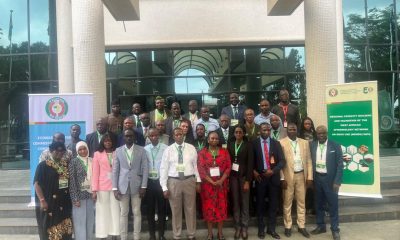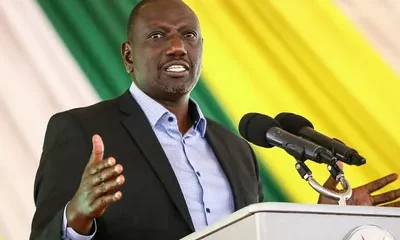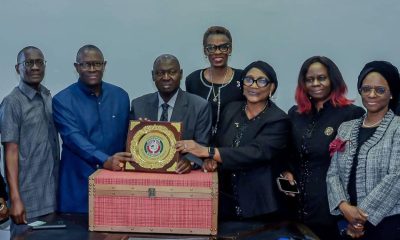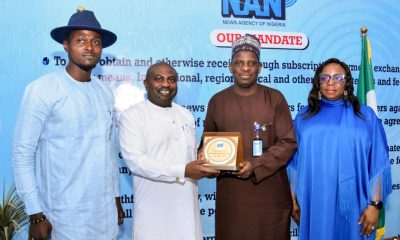FOREIGN NEWS
ECOWAS Faces Unprecedented Challenges, Court President Laments, Delivers Landmark Ruling On Blasphemy Laws
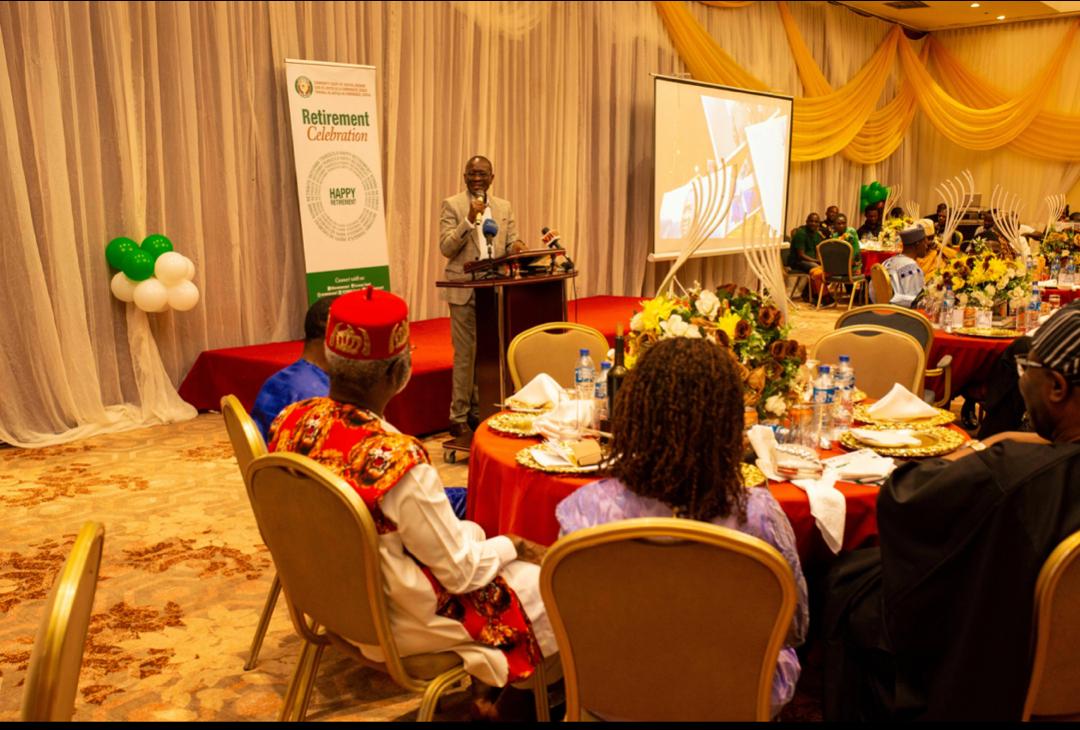
The Economic Community of West African States (ECOWAS) said it’s facing an unprecedented crisis, according to the President, Hon. Justice Ricardo Cláudio Monteiro Gonçalves, who made the announcement Wednesday in Abuja.
Speaking at a send-off ceremony for four retiring ECOWAS Court of Justice staff members, Justice Gonçalves painted a stark picture of a regional bloc facing challenges unprecedented in its nearly 50-year history.
“For the first time in nearly fifty years of its existence, the ECOWAS Community is confronted, at once, with the departure of three countries,” Justice Gonçalves stated, referring to Mali, Burkina Faso, and Niger’s recent announcements to withdraw from the organisation.
He warned of the potential consequences “on a social, financial, and security level in our subregion.”
Despite the sombre assessment, the President expressed confidence in the regional leadership’s ability to navigate the turbulent waters.
“We believe that our political decision-makers will know how to take advantage of this moment to carry out a profound reflection on the path taken and what is intended for our Community in the next fifty years,” he asserted, emphasising the importance of a “plural, open, inclusive, participatory” dialogue involving civil society.
Beyond the broader geopolitical challenges, Justice Gonçalves addressed the internal challenges confronting the ECOWAS Court of Justice. He cited the ongoing issue of “implementing our decisions” as a major impediment, along with the need to operationalise the Court’s arbitration jurisdiction, use the prejudicial referral mechanism for legal advisory opinions, and establish a legal aid fund.
The President emphasised the importance of human resource development at the Court. He encouraged staff to embrace “professionalism, commitment and unreserved dedication, proactivity, knowledge of the profession, firm commitment to professional ethics and deontology,” emphasising that these qualities are critical to the Court’s continued success and international recognition.
Addressing the retiring staff members – Dr Athanase Atannon, Dr William Towah, Mr Félicien Hounkanrin, and Mr Iliyas Jonah – Justice Gonçalves praised their contributions and acknowledged the difficulties they faced during their tenure.
“Each of you leaves an indelible mark on this institution, both through your professional accomplishments and, most importantly, through the impact you have had on those around you.
Mr. Ghislain Agbozo, representing the Court staff, echoed these sentiments in a goodwill message, thanking the retirees for their dedication and wishing them success in their future endeavours.
Mr Félicien Hounkanrin, one of the retiring staff, expressed his gratitude for the farewell ceremony, emphasising the sense of community and family at the ECOWAS Court.
Concurrently with these internal challenges, the ECOWAS Court of Justice issued a significant ruling that could have far-reaching consequences for human rights in the region. The Court ruled that the blasphemy provisions in Kano State law violate Nigeria’s international human rights obligations, particularly those concerning freedom of expression.
The case, Incorporated Trustees of Expression Now Human Rights Initiative v. Federal Republic of Nigeria, was filed by a Nigerian NGO concerned about the application of blasphemy laws, which resulted in arbitrary arrests, detentions, and death sentences.
The organisation also highlighted cases of vigilante justice against those accused of blasphemy.
In its ruling, the Court struck down two key blasphemy provisions in Kano State law: Section 210 of the Kano State Penal Code, which it deemed too vague, and Section 382(b) of the Kano State Sharia Penal Code Law (2000), which imposes the death penalty for insulting the Prophet Muhammad, calling it “excessive and disproportionate.”
While acknowledging the states’ legitimate interest in maintaining public order and respecting religious beliefs, the Court determined that these laws did not meet the international human rights standards of legality, necessity, and proportionality.
The panel of judges included Hon. Justice Ricardo Cláudio Monteiro Gonçalves (Presiding Judge), Hon. Justice Sengu Mohamed Koroma (Member), and Hon. Justice Dupe Atoki (Judge Rapporteur).
This landmark decision demonstrates the ECOWAS Court’s commitment to protecting human rights in the region, despite significant internal and external pressures.
The decision is likely to spark debate and scrutiny of similar laws in West Africa and elsewhere, prompting a reassessment of the balance between free expression and religious protection.
-
CRIME3 years ago
PSC Dismisses DCP Abba Kyari, To Be Prosecuted Over Alleged $1.1m Fraud
-
FEATURED3 years ago
2022 Will Brighten Possibility Of Osinbajo Presidency, Says TPP
-
FEATURED2 years ago
Buhari’s Ministers, CEOs Should Be Held Accountable Along With Emefiele, Says Timi Frank
-
BUSINESS & ECONOMY2 years ago
Oyedemi Reigns As 2023’s Real Estate Humanitarian Of The Year
-
SPORTS1 year ago
BREAKING: Jürgen Klopp Quits Liverpool As Manager At End Of Season
-
SPORTS2 years ago
Could Liverpool Afford Kylian Mbappe For €200 million? Wages, Transfer Fee
-
ENTERTAINMENT2 years ago
Veteran Nigerian Musician, Basil Akalonu Dies At 72
-
FEATURED2 years ago
Tribunal Judgement: Peter Obi Warns Of Vanishing Electoral Jurisprudence, Heads To Supreme Court
-
BUSINESS & ECONOMY2 years ago
Oyedemi Bags ‘Next Bulls Award’ As BusinessDay Celebrates Top 25 CEOs/ Business Leaders
-
FEATURED3 years ago
2023 Presidency: South East PDP Aspirants Unite, Demand Party Ticket For Zone

